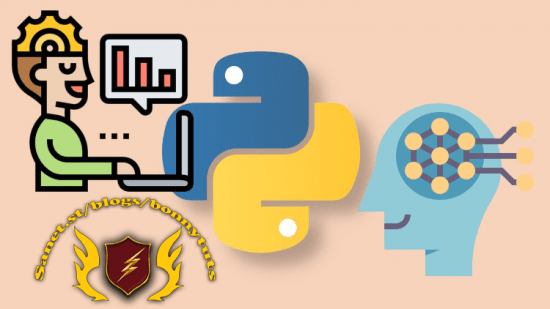
Published 05/2022
MP4 | Video: h264, 1280×720 | Audio: AAC, 44.1 KHz, 2 Ch
Genre: eLearning | Language: English + srt | Duration: 15 lectures (2h 35m) | Size: 965 MB
A quick introduction to machine learning using python scikit-learn linear regression for modelling and prediction
What you’ll learn
Python 3
Exploratory data analysis and visualizations
Machine learning
Building prediction models
Linear regression
Evaluating models
Creating Jupyter notebooks in Jupyter Lab
Common python operations in Jupypter notebooks
Using scikit-learn for machine learning
and more…
Requirements
Windows PC
No programming experience needed. You will learn everything you need to know.
Description
If you are looking for a fast and quick introduction to python machine learning, then this course is for you. It is designed to give beginners a quick practical introduction to machine learning by doing hands-on labs using python and JupyterLab. I know some beginners just want to know what machine learning is without too much dry theory and wasting time on data cleaning. So, in this course, we will skip data cleaning. All datasets is highly simplified already cleaned, so that you can just jump to machine learning directly.
Machine learning (ML) is a type of artificial intelligence (AI) that allows software applications to become more accurate at predicting outcomes without being explicitly programmed to do so. Machine learning algorithms use historical data as input to predict new output values.
Scikit-learn (also known as sklearn) is a free software machine learning library for the Python programming language. It features various classification, regression and clustering algorithms.
Python is a high-level, interpreted, general-purpose programming language. Its design philosophy emphasizes code readability with the use of indentations to signify code-blocks. It is also the language of choice for machine learning and artificial intelligence.
JupyterLab is the latest web-based interactive development environment for notebooks, code, and data. Its flexible interface allows users to configure and arrange workflows in data science, scientific computing, computational journalism, and machine learning. Inside JupyterLab, we can create multiple notebooks. Each notebook for every machine learning project.
In this introductory course, we will cover very simplified machine learning by using python and scikit-learn to do predictions. And we will perform machine learning all using the web-based interface workspace also known as Jupyter Lab. I have chosen Jupyter Lab for its simplicity compared to Anaconda which can be complicated for beginners. Using Jupyter Lab, installation of any python modules can be easily done using python’s native package manager called pip. It simplifies the user experience a lot as compared to Anaconda.
Features of this course
simplicity and minimalistic, direct to the point
designed with absolute beginners in mind
quick and fast intro to machine learning using Linear Regression
data cleaning is omitted as all datasets has been cleaned
for those who want a fast and quick way to get a taste of machine learning
all tools (Jupyter Lab) used are completely free
introduction to kaggle for further studies
Learning objectives
At the end of this course, you will
Have a very good taste of what machine learning is all about
Be equipped with the fundamental skillsets of Jupyter Lab and Jupyter Notebook, and
Ready to undertake more advanced topics in Machine Learning
Who this course is for
Anyone wanting to get a quick taste hands-on machine learning
Complete beginners to machine learning
Anyone wanting to learn how to create Jupyter Notebooks using Jupyter Lab instead of Anaconda

Password/解压密码www.tbtos.com
转载请注明:0daytown » Introduction to Python Machine Learning using Jupyter Lab